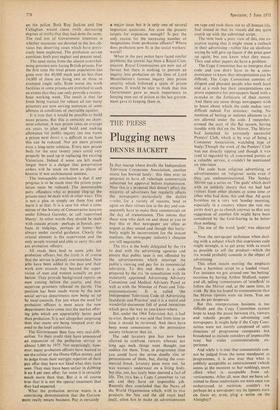THE PRESS
Plugging news
DENNIS HACKETT
In that teacup where dwells the Independent Television Companies Association, another storm has brewed lately: this time over its proposal to have all videotape commercials submitted for approval before transmission. Now this is a proposal that doesn't affect the majority of advertisers but regularly affects the newspapers—particularly the dailies —who, for a variety of reasons, tend to agree on their virtues late in the day and con- sequently have to make their commercials on the day of transmission. This means that those men who dash on and shout at you to buy this or that newspaper are often as urgent as they sound and though this hurly- burly might be inconvenient for the instant medium, the newspaper industry's cheques arc still negotiable.
The ITCA is the body delegated by the ITA to deal with the advertising agencies and ensure that public taste is not offended by the advertisements which interrupt the public's viewing and pay for its commercial television. To this end there is a code prepared by the ITA 'in consultation with its statutorily appointed Advertising Advisory Committee and Medical Advisory Panel as well as with the Minister of Posts and Tele- communications.' It is called 'the Independent Television Code of Advertising Standards and Practice' and it is a weird and wonderful-document full of good intentions which pave the way to you-know-where.
But, under the 1964 Television Act, it had to exist, though it was said that from time to time it should be reviewed. And there have been some concessions to the permissive society (whatever that is).
The odd lavatory pan has now been allowed to confront viewers whereas not long ago such things were thought too sudden for them. True, in programme time you could have the seven deadly sins or permutations of them, but, during the com- mercial break, lavatory pans were out. So was women's underwear on a living body, but this, too, has lately been deemed a fact of life. The ITCA has a Copy Committee to vet ads and they have an impossible job. Recently they concluded that the News of the World Organisation which, with its two products the Sun and the old roast beef itself, often has to make its advertisements
on tape and rush them Out to all human life, had sinned in that its visuals did not quite match up with the submitted script.
The NOW took a poor view of this, one ex- ecutive saying that it might mean a cutback
in their advertising—rather like an alcoholic saying he will give up liquor if the price goes up again, but you know what they mean. They and other papers do have a problem.
The Copy Committee has to interpret that code and you don't have to be a com- municator to know that interpretation can be difficult. The Copy Committee consists of diligent and pleasant people who work hard and at a rush but their interpretations can prove expensive for newspapers faced with a re-make or the forfeiture of their money.
And there are some things newspapers wish to boast about which the code makes very difficult indeed. For instance: racing. No mention of betting or indirect allusions to it are allowed under the code. I remember, around the start of the flat season, having trouble with this on the Mirror. The Mirror had launched its extremely successful Punters' Club, which is by way of being a Consumer Association, watchdog type of body. Though the work of the Punters' Club was not directly tipping and though it was (and is) regarded by all concerned parties as a valuable service, it couldn't be mentioned on television.
The code bans religious advertising or advertisements on 'religious' series even if they are undenominational. The Sunday Mirror ran a series on 'The gods' which dealt with an unlikely theory that we had had visitors from other planets at some time or other who had done this and that. All quite harmless on a very wet Sunday morning, especially in a country where the vast ma- jority don't go to church anyway so that any suggestion of another life might have been considered by the God-fearing to be better than nothing.
The use of the word 'gods' was objected to.
Now the newspaper technique when deal- ing with a subject which this capricious code might strangle, is to get away with as much as possible to sell the product—which the rra would probably concede is the object of advertising.
This often means moving the emphasis from a harmless script to a loaded visual. For instance we got around one `no betting' occasion by having Arthur Mullard, topper and all, telling 'connoisseurs of 'orseflesh' to follow the Mirror and, at the same time, to wink. By this we hoped to communicate that the Mirror tipsters were on form. You see you do get desperate.
But this interpretation business is too difficult and the Copy Committee cannot hope to keep the peace between ITA, viewers and volatile people in advertising and newspapers. It might help if the Copy Com- mittee were not merely composed of sales directors of programme companies but broadened to include outsiders of impeccable taste but wider communications ex- perience.
And while it is true that commercials can- not be judged from the same standpoint as programmes, it is also true that what is publicly acceptable as entertainment (which seems at the moment to bar nothing), must affect what is acceptable from ad- vertisements. After all, now that we have ad- mitted to those understains we were once too embarrassed to mention, couldn't we perhaps let a newspaper say its tipsters were on form or, even, plug a series on the Almighty?


































 Previous page
Previous page